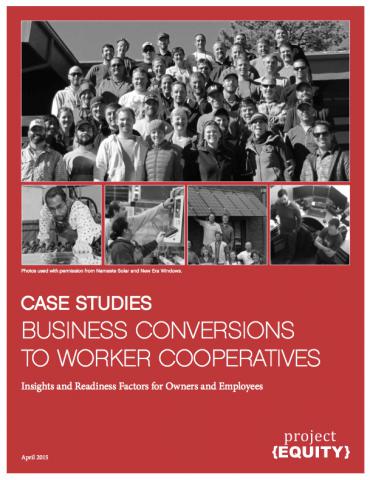These 12 case studies explore the practical promises and pitfalls of converting existing businesses to worker cooperative ownership—a key strategy for building more democratic workplaces.
In her report for the Democracy Collaborative, Worker Cooperatives: Pathways to Scale, Project Equity’s Hilary Abell identified the conversion of successful existing businesses to democratic ownership as a key strategic path to a larger worker cooperative sector in the United States. Now, her colleague and Project Equity co-founder Alison Lingane, together with Shannon Rieger, provides a powerful collection of case studies aimed at helping owners, employees, and practitioners navigate the practical issues around worker cooperative conversions.
Employee ownership is a powerful way for a business owner to engage and retain talented employees, generate community wealth, and increase a business’ efficiency and financial performance. Worker-owned cooperatives in particular, are a powerful way for employees to gain a voice in their workplace and in key business decisions, and to increase financial assets as their ownership stake in the business increases. Worker-owned cooperatives differ from other forms of business enterprise in that their members (the workers) are the ones who own the business, who control it, and who are its primary beneficiaries.
Most people don’t know how transitions to employee ownership work: that an owner can sell the business to the employees in order to retire or leave for other reasons, or that a business can transition to employee ownership without the owner leaving the company. With the growing number of retiring baby-boomer business owners, we have an opportunity to help those businesses—and their employees—harness the power of employee ownership.
So how does a business go about transitioning —“converting”— to a worker-owned cooperative? We set out to illustrate this by pulling together a set of case studies of businesses that have converted, then highlighting key lessons and effective practices from those companies’ experiences. Whether you are a business owner, an employee in a business that could be a candidate for worker ownership, or a practitioner who supports business conversions, we hope that this resource will deepen your understanding of the conversion process.
Read Business Conversions to Worker Cooperatives
Contents:
Introduction
Typology of Conversions
Conversion Types
Readiness Factors
Case Study Summary
Type I Conversions
Big Timberworks
Namaste Solar
Pattycake Bakery
Real Pickles
Type II Conversions
Island Employee Cooperative
Select Machine
Type II Conversions
Local Flavor
Simple Diaper & Linen
Type IV Conversions
Center Point Counseling
Collective Copies
New Era Windows Cooperative
Taste of Denmark
Conclusion





